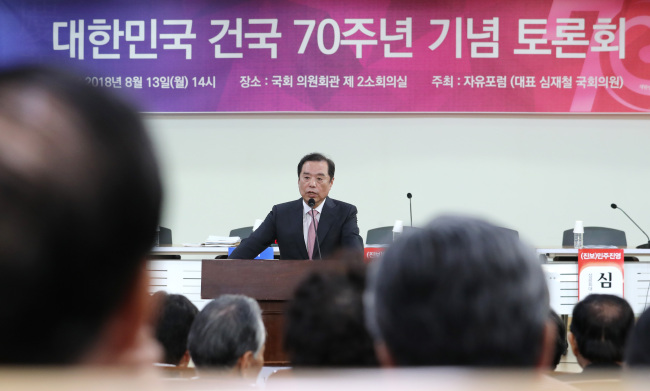For the past decade or so, the question of when the Republic of Korea was founded has been a divisive issue. On Monday a familiar scene played out at the National Assembly, where academics gathered to discuss the issue at a forum hosted by five-term lawmaker Rep. Shim Jae-cheol of the main opposition Liberty Korea Party. The forum was deliberately scheduled ahead of Liberation Day, the national holiday that commemorates the liberation of the Korean Peninsula from Japanese colonial rule on Aug. 15, 1945.
The republic was born on the same date three years later, say the country’s conservatives, with the inauguration of President Syngman Rhee. Many liberals, however, contend that that the nation’s true founding year was 1919, when independence activists established the Provisional Government of the Republic of Korea in Shanghai.
 |
(Yonhap) |
“There are needless disputes over the foundation day of South Korea, and we invited panelists from both sides,” Rep. Shin said in his opening speech. “Those in support of 1948 as the foundation year, and those in support of 1919.”
President Moon Jae-in, a member of the liberal Democratic Party of Korea, said last year in his Liberation Day speech that 2019 would mark the 100th anniversary of the country’s founding.
Those who favor 1948 would like to change the Aug. 15 holiday’s name from Liberation Day to National Foundation Day. Korea currently celebrates National Foundation Day on Oct. 3 in honor of the legendary founding of the first Korean nation -- Gojoseon -- in 2333 BC.
Speakers at the forum who argued in favor of the name change and the primacy of the 1948 date were Yang Dong-an, an honorary professor at the Academy of Korean Studies; Lee Young-hoon, an honorary professor from Seoul National University; and Lee Ju-cheon, a former professor at Wonkwang University.
Representing the opposing side, favoring 1919, were Kim Min-cheol, a researcher at the Institute for Research in Collaborationist Activities; Jeon Woo-yong of the Academy of Korean Studies; and Shim Yong-hwan, an adjunct professor from Sungkonghoe University.
“There is obvious evidence that the country started in 1948,” said Yang. “You cannot fight over the birth date of a child, and you do not say the child is born while the mother is pregnant. It is also the same in North Korea. Their (Day of the Foundation of the Republic) is Sept. 9, 1948.”
He also argued that it was important to designate a National Foundation Day to encourage patriotism and to give the country a solid identity.
In response, those advocating the position that 1919 is the true founding year cited the preamble to the nation’s Constitution, which was promulgated July 17, 1948.
“We, the people of Korea,” the Constitution begins, “proud of a resplendent history and traditions dating from time immemorial, upholding the cause of the Provisional Republic of Korea Government born of the March First Independence Movement of 1919 ... .“
Jeon said, “As a Korean citizen who obeys the Constitution, I uphold the law that states the government was born of the March First Independence Movement of 1919.”
Lee, arguing for the 1948 National Foundation Day position, said the Constitution was only stating that the country had succeeded in realizing the spirit of the March 1 movement. The Constitution, he argued, was officially declaring the beginning of a new country in 1948.
Jeon further argued that a number of national symbols had been in existence long before 1948 and the provisional government had begun using them in 1919 to forge a national identity. As examples he cited the Taegeukgi, the national flag created under King Gojong, the last monarch of Joseon (1392-1910); the national anthem, “Aegukga”; and the country’s name, “Daehan Minguk” or the Republic of Korea.
The liberal panelist at Monday‘s discussion also expressed the view that there was no reason to specify a date marking the official birth of the Korean nation because four national holidays already served that purpose.
Kim, a fellow panelist on the 1919 side, concurred.
“The people at the time (of their designation) designated the four national holidays -- Constitution Day on July 17, Independence Movement Day on March 1, Liberation Day on Aug. 15 and National Foundation Day on Oct. 3 -- but did not specify one founding date,” Kim said. “It shows how they viewed this country and set its identity in that way.”
By Jo He-rim (
herim@heraldcorp.com)





![[KH Explains] For Korean automakers, Chinese EVs may loom larger than Trump’s tariffs](http://res.heraldm.com/phpwas/restmb_idxmake.php?idx=644&simg=/content/image/2024/11/14/20241114050537_0.jpg)
![[Graphic News] Tainan predicted top destination for South Koreans in 2025](http://res.heraldm.com/phpwas/restmb_idxmake.php?idx=644&simg=/content/image/2024/11/13/20241113050807_0.gif)

![[Herald Review] Cho Seung-woo takes 'Hamlet' crown](http://res.heraldm.com/phpwas/restmb_idxmake.php?idx=644&simg=/content/image/2024/11/14/20241114050593_0.jpg)